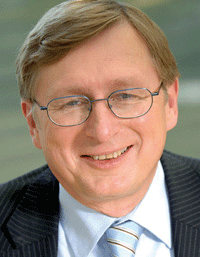Munich
Takes Its Case
To Frankfurt
 Munich’s
Franz Josef Strauss is on its way to become the leading airport in Germany. Munich’s
Franz Josef Strauss is on its way to become the leading airport in Germany.
“In the long run we will be capable
of managing up to 103 million passengers yearly,” announced the
airport’s Managing Director, Michael Kerkloh, at Frankfurt-based
Air Cargo Club Deutschland (ACD).
Last year, Munich reported 34 million air
travelers, with 58.2 million expected in 2025 together with 850,000 tons
of airfreight. In comparison, Frankfurt announced 52 million passengers
in 2009 and 1.8 million tons of cargo.
The biggest point made by Kerkloh is the
ability of his airport to further enlarge the ground infrastructure. “In
contrast to jammed Rhein-Main, we’ve got enough space for building
additional infrastructure at our site according to growing demand,”
exclaimed Kerkloh.
Future plans foresee the construction of
a third runway capable of accommodating long-haul traffic, a new passenger
satellite at the airport’s apron, an additional building for the
forwarding industry and handling agents with neighboring warehouse space,
and last but not least, a third passenger terminal.
He further mentioned an ongoing shift of
air traffic from the European periphery to the center of the continent
due to numerous new member states of the European Union in East Europe,
namely Hungary, the Czech Republic, Poland, Slovakia and Croatia.
“With Munich being right in the middle
of the continent,” he said.
One indication of this traffic shift is
Lufthansa’s step to base part of the airline’s long-haul fleet
in Munich. The airport currently accommodates
25 Airbus A340-300 and -600 with the crane at the tail, which serve 32
intercontinental routes.
In addition, Michael mentioned the strong
performing economy in southern Germany with global players like Siemens,
Adidas, Puma, BMW, Audi and Mercedes having their headquarters there.
“These combined factors trigger additional
air traffic, be it passenger or cargo transports,” he said.
A lasting annoying hurdle, however, is the
missing of a railway track for linking the airport with high-speed trains
like the German ICE. Also an express subway is eagerly needed for faster
connectivity between Munich’s central station and the airport.
Today a point-to-point ride includes more
than 10 stops, making it a tiring 50-minute trip.
According to Kerkloh, between 400 and 500
staff of the airport’s ground handling unit will soon lose their
jobs. Private competitors like Swissport/Losch offer cheaper services
to the airlines. “That’s why we lost a number of clients recently,”
admitted the manager. Among them are well known players like Continental
Airlines, Air Berlin and Germanwings.
“This is the price we have to pay
as result of a liberalized commercial environment in the European aviation
sector,” commented Kerkloh.
The only chance to prevent more airlines
from turning their back on the airport’s ground service unit is
a new wage agreement that the remaining 1,500 employees would have to
be willing to accept. “We are negotiating this issue currently,”
Herr Kerkloh states.
Heiner Siegmund
|



